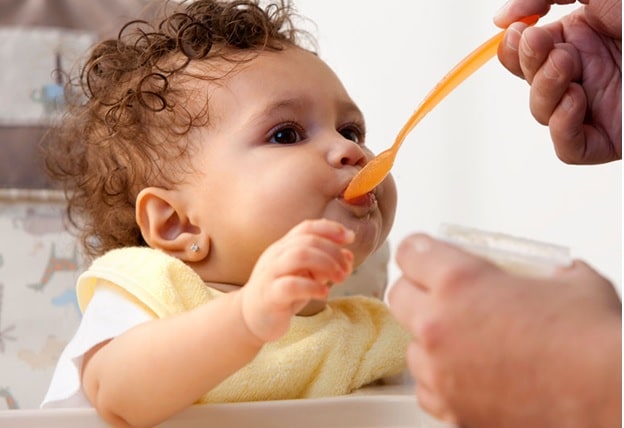Table of Contents
Overview
Introducing solid foods to babies can be a stressful experience even for confident parents. There is a lot of information available, and you may get many different advises from your loved ones as well.
In this blog I will explain most suitable way to start solids in babies and the sign of solid readiness. We have collaborated with a certified dietitian and nutritionist to provide you with the latest evidence-based nutritional guidelines for your little one’s solid journey.
When to Start Solid food for babies
The recommended age for introducing solid foods varies from child to child. However, the World Health Organization advises introducing solids between 4 and 6 months of age. At this stage, your infant may show some indications of being prepared for solid foods.
Below are some of the signs of solid readiness that your baby can give:
- Babies start sitting independently or with limited assistance.
- Show control over their neck and head. Good head and neck control are crucial to minimize the risk of choking, making this a significant sign of readiness.
- The infant is interested in the food when they see someone eating.
- Baby attempts to grab and put objects, such as toys and food in mouth.
- The infant opens their mouth when they see food.
- Baby starts swallowing food and don’t take it out of mouth.
What Are the Recommended First Foods for babies when starting solid?
14 home remedies for diaper rash in babies and tips to prevent it.
According to the American Academy of Pediatrics, there is no prescribed order for introducing foods to most children.
Infants can start solid food at approximately 6 months of age. Infants aged 7-8 months can consume different foods from different food categories. The foods recommended for babies include cereals, proteins, fruits, vegetables, grains, yoghurts, cheeses, and other options.

It is recommended to provide a wide range of fortified infant cereals, including oat, barley, and multi-grain, rather than solely relying on rice cereal when starting solids.
There are no guidelines for selecting a baby’s first food or meal. However, it is advisable to choose foods from the following three categories:
How and when to start baby on solids. Sample schedule to follow.
- Iron-rich foods include meat, eggs, fish, nuts, seeds, green leafy vegetables, tofu, and iron-fortified infant cereal. Ensure that the texture of all foods provided is developmentally suitable for your infant.
- Energy-dense foods, such as meat, eggs, oily fish, avocado, sweet potato, white potato, full-fat dairy products, and banana, are high in calories.
- Infants experience rapid growth and have limited food intake due to their small stomach capacity. Energy-dense foods provide a high amount of energy per gram.
The period between 6 and 9 months is very important for introducing various textures and flavors of fruits and vegetables. It is recommended to take advantage of this time when babies are more adaptive to these foods by providing different options.
- Allergenic food items.
All protein-containing foods can have allergenic reactions on babies, but some of the below specific foods are more commonly associated with allergic reactions. These items are:
- Dairy product cow’s milk
- Egg
- Peanuts and tree nuts.
- Sesame
- Soy
- Aquatic animals such as fish and shellfish.
- wheat
Is It Recommended to delay the Introduction of Potentially Allergenic Foods Until After 12 Months of Age?
No it is not recommended in fact there is no answer to this question. Studies indicate that introducing common food allergens to kids at approximately 6 months, rather than before 4 months, may decrease the development of the infant food allergies.
21 Amazing home remedies for cough for infants that actually work
If a family member of a young child, such as a sibling or parent, has a food allergy. In that case, it is advisable to consult a physician before introducing solid foods or that food item.
How should you start your child on solid foods?
Here are the few steps and point to remember when starting solid for babies:

- Always start slow and gradually increase the frequency. Start feeding a small quantity of food, approximately 1 teaspoon, to prevent over-feeding the infant during the initial feeding sessions. Gradually adjust the amount of food based on the child’s hunger or satisfaction signals.
- Introduce single-ingredient foods to your child one at a time initially. This helps the identification of potential food-related issues in children, such as allergies.
- Keeping a waiting period of 3 to 5 days is recommended before introducing a new food. Soon, children will start consuming various types of food.
- Introduce allergenic foods simultaneously with other foods. Try to avoid completely cow’s milk or fortified soy beverages until the child reaches 12 months of age. However, other cow’s milk products, including yoghurt, can be introduced before the child turns 12 months old.
- Always consult with your child’s healthcare provider regarding the appropriate timing and method for introducing peanut-containing foods if your child has severe eczema or egg allergy.
- Try to introduce new solid food during lunch and gradually introducing new food items one at a time.
- This helps in monitoring the infant’s response to particular foods, including solid foods and allows for sufficient digestion time before sleep. This can aid in preventing digestive discomfort for infants.
Should solid food be served before milk feeds?
Although milk remains the primary source of nutrition until 12 months of age, solid food becomes increasingly crucial in meeting the nutritional requirements of infants starting at 6 months old.
Breast milk or formula alone is insufficient in providing all the necessary nutrients, especially iron, for babies from 6 months onwards. Achieving a balance between prioritizing milk feeds and introducing solid foods is important.
Signs of Colic in Newborn! FAQs & Home Remedies to deal with it
Still you can prioritizing milk over solids until approximately 8 months of age. At 8 months, infants are typically proficient in consuming solid foods and gradually decreasing their milk intake. Therefore, it is an good time to introduce a new feeding pattern by providing solid foods before milking during certain meals.
What is the Appropriate Amount of Food for a Baby? How much your baby should eat?
There is no fixed quantity for the food intake of young children. Like adults, the required amount of food for children varies based on their appetite, type of food, prior food intake, and milk consumption within the last two days.
Infants are considered to have transitioned to solid foods when they consume 2-3 meals daily, each consisting of roughly 1/2 cup of solid food. Infants typically achieve this milestone at approximately 8 months of age, although there may be variations in individual cases.
It is crucial to see your children’s hunger and fullness cues to provide them with appropriate meals.
Signs that baby is hungry
Here are few signs to looks for baby’s hunger cues.
- Kids exhibited a gesture of clenching their fists over their chest.
- Exhibiting muscular contractions in the limbs.
- Bringing their hands to their mouth.
- Filling their mouths with objects
- The behavior of smacking or licking one’s lips.
- Rotating the head.
- The individual’s indication or physical movement towards food.
- Gesturing towards the elevated seating apparatus designed for infants and young children.
- Making suction sounds.
- They exhibit restlessness or lack of focus.
Signs that a child can give when not hungry
- They are exhibiting a self-touch gesture by placing their hand on their face.
- Babies don’t open their mouths when the spoon is near their lips.
- Shows negative facial expressions such as grimacing, pouting, or frowning.
- Avoid eye contact.
- Expel food from their oral cavity.
- Shows signs of dissatisfaction or annoyance.
- They exhibit signs of agitation or restlessness.
- Turning their heads away.
What Food Preparation Techniques Should I Use for My Child?
Initially, it is advisable to introduce your child to foods that are smooth in texture, such as mashed, pureed, or strained foods. Children may require a period of adjustment to adapt food textures. Infants may start coughing, gagging, or regurgitation while feeding as well. Providing appropriate textured foods to children is crucial to avoid choking hazards.
To reduce the risk of choking, preparing foods which are soluble in saliva and do not extensive mastication is advisable. Offer small portions and promote gradual eating in infants. Supervise your child during meals.

Food preparation tips
- Combine cereals and cooked grains with breast milk, formula, or water to create a smooth, easily ingestible consistency for infants.
- Process foods into a smooth consistency by mashing or pureeing them.
- For hard fruits and vegetables, such as apples and carrots, steaming is necessary to mash them and make them puree.
- Cook the food until it reaches a soft consistency that allows easy mashing with a fork.
- Before cooking, trim the excess fat, skin, and bones from poultry, meat, and fish.
- Fruit should be cleaned of seeds and tough pits before being chopped into small pieces.
- Slice or dice soft food into small pieces.
- To prevent airway obstruction, slice cylindrical foods such as hot dogs, sausage, and string cheese into thin strips rather than round pieces.
- Dice spherical foods such as grapes, cherries, berries, and tomatoes.
- Cook and pulverize whole-grain kernels of various grains such as wheat, barley, and rice.
FAQs when starting solid food for babies
1. What happens if we start solids at 4 months?
Recent studies suggest that introducing solid foods to infants at 4 months may enhance their acceptance of various fruits and vegetables in the future, reduce the likelihood of feeding difficulties and food allergies, and not elevate the risk of childhood obesity. You should not start solids before 4 months and after that it is crucial to check the sign of solid readiness, if your child is ready to start solid then you can start else you can wait until they reach to 6 months.
2. When can you introduce water to the baby?
Water can be introduced to babies who have started consuming solid foods (around 6 months old) by providing them with a cup or beaker during meals. If your child is not eating solids, breastfeed will help them to keep hydrated and there is no need to introduce water before that.
3. Is 5 months too early for solids?
Medical professionals advise waiting the introduction of solid foods until the infant reaches approximately six months of age. Introducing solids before a period of four months is not advisable. Infants require the additional nutrients, including iron and zinc, found in solid foods at approximately 6 months of age.





